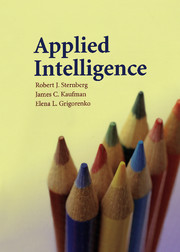Book contents
- Frontmatter
- Contents
- Preface
- 1 Views of Intelligence
- 2 The Theory of Successful Human Intelligence
- 3 Metacognition: Thinking with Metacomponents
- 4 Advanced Problem-Solving Steps
- 5 Cognitive Processing: Performance Components (I)
- 6 Cognitive Processing: Performance Components (II)
- 7 Logical Reasoning and Analysis of Arguments: Performance Components (III)
- 8 Inference and Inferential Fallacies
- 9 Knowledge-Acquisition Components
- 10 Coping with Novelty
- 11 Deciding for Creativity
- 12 Automatizing Information Processing
- 13 Practical Intelligence
- 14 Why Intelligent People Fail (Too Often)
- References
- Author Index
- Subject Index
8 - Inference and Inferential Fallacies
Published online by Cambridge University Press: 09 November 2009
- Frontmatter
- Contents
- Preface
- 1 Views of Intelligence
- 2 The Theory of Successful Human Intelligence
- 3 Metacognition: Thinking with Metacomponents
- 4 Advanced Problem-Solving Steps
- 5 Cognitive Processing: Performance Components (I)
- 6 Cognitive Processing: Performance Components (II)
- 7 Logical Reasoning and Analysis of Arguments: Performance Components (III)
- 8 Inference and Inferential Fallacies
- 9 Knowledge-Acquisition Components
- 10 Coping with Novelty
- 11 Deciding for Creativity
- 12 Automatizing Information Processing
- 13 Practical Intelligence
- 14 Why Intelligent People Fail (Too Often)
- References
- Author Index
- Subject Index
Summary
If we were to select one performance component as most important of all, we might well select inference. Although people reason all the time, not all of these inferences or conclusions are correct or justified by the data. Philosophers and psychologists have attempted to classify and study the various kinds of erroneous inferences (rickety reasoning) that people can make. In classifying types of inferences, they refer to fallacies.
In the broader sense, fallacies are mistakes that occur in arguments and that affect the argument's strength. The Latin verb fallere signifies deception. Indeed, fallacious reasoning may be deceptive, because it comes across as sensible reasoning. However, in its modern meaning, fallacious reasoning refers to reasoning that is invalid or irrelevant because it accepts the premises without enough grounds to do so, or fails to use the relevant known facts. Fallacy is often hard to detect – it is simply an error in reasoning or falseness in an argument that seems sound.
There is no narrow, precise definition of fallacy. The concept of fallacy is closely linked to the concepts of intuition and counterintuition. Likewise, there is no universally accepted classification of fallacies. Aristotle drew up the first catalogue of fallacies and demonstrated that bad reasoning obeys certain patterns. The classification described here is by no means the only one or even necessarily the best one. This list is based on the work of many philosophers and psychologists.
- Type
- Chapter
- Information
- Applied Intelligence , pp. 204 - 228Publisher: Cambridge University PressPrint publication year: 2008
- 1
- Cited by



